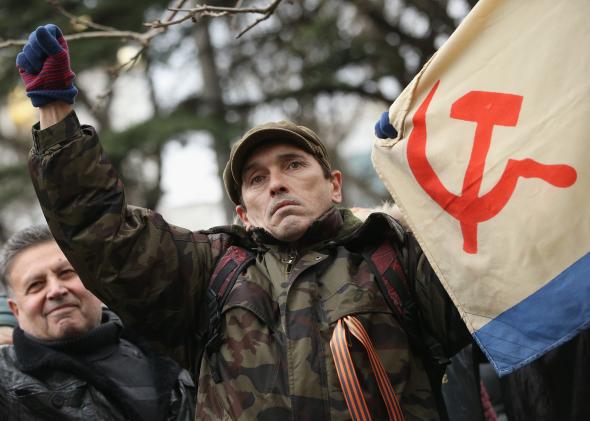SIMFEROPOL, Ukraine—The hunt for Viktor Yanukovych ended on Friday, when Vitya himself popped up for a press conference in the southern Russian city of Rostov-on-Don. The former Ukrainian president offered a roundabout explanation for how he landed in Russia, ultimately claiming that he had come “to visit an old friend.” He seemed to inhabit an alternate universe, awkwardly batting away questions about the massive wealth he accumulated during his tenure. The fugitive Ukrainian leader also insisted on the legitimacy of his presidency, despite the formation of an opposition government in Kiev.
“If the current president has not resigned, if he is alive—and, as you can see, I am alive—then he is still the president,” said Yanukovych, speaking in Russian.
Tensions continue to escalate across Crimea, a bastion of opposition to Yanukovych’s overthrow and home to part of Russia’s Black Sea fleet. Russian armed personal carriers roamed the Black Sea peninsula on Friday, and unidentified masked gunmen, believed to be Russian, seized two Crimean airports and a major telecommunication company. In response, Ukraine’s new acting president, Oleksandr Turchynov, accused Russia of “provoking conflict” and warned of “serious consequences” for any intrusion onto Ukrainian territory.
The tale of the two presidents—one hiding behind the Russian border and the other resisting an apparent advance from that same border—raises a pair of crucial questions: Who is Ukraine’s president in the eyes of the people? And does the population at large accept the legitimacy of the new administration?
While Turchynov and the opposition government enjoy overwhelming support in Kiev, the site of lethal battles with Yanukovych’s Berkut riot police, residents in Eastern and Southern Ukraine remain deeply suspicious of the “Euromaidan.”
At least in legal terms, Yanukovych’s legitimacy as president remains undiminished in the eyes of many outside Kiev. These supporters consider his election fair and honest, and his removal from power a virtual coup.
“Only when there are elections can we decide whether [Yanukovych] was right or not, whether he was good or not,” said Anatoly, a citizen militiaman from Simferopol who declined to give his last name. “He’s president until 2015; let him be, whether you like him or not. We picked him. Say he lied, say he acted improperly, say he stole—we picked him.”
In Simferopol, Crimea’s capital, crumbling pre-revolutionary facades line the streets, lending a quaint air to an otherwise edgy atmosphere. Ethnic Russians make up the majority of the city’s nearly 250,000 people. Following the new government’s ascension and passage of a series of controversial laws (most notably, a bill that prevented Russian from being an official language), anti-Maidan protesters began amassing. For several days, they have gathered outside the Crimean parliament building, which was occupied by unidentified militants on Thursday. They chant “Russia, Russia!” and “Glory to the Berkut!,” an unironic inversion of the Maidan slogan “Glory to the Heroes!”
Nonetheless, if they object to his ouster, these same forces have little personal respect left for the man who they claim deserted his people. Among the anti-Maidan crowd, Yanukovych’s corruption was not his greatest flaw; instead, it was his failure to crack down harder on the Kiev’s protesters.
“Today, Yanukovych is the legitimate president,” says Konstantin Bakharev, deputy chairman of the Crimean parliament. “But we have questions for him, questions as the leader of the government about his moral responsibility before the society, before the party he once led, and before Crimeans.”
Yanukovych’s haphazard retreat and the questionable reach of the new government’s influence have left regional actors—from geopolitical powers like Russian and the European Union, all the way down to local self-defense groups in Ukrainian cities—clamoring to fill the de facto power vacuum.
“We came here to defend the autonomy of Crimea from all outside forces. We don’t want anyone from Kiev or Lviv deciding what happens here,” said Vyacheslav Takmakov, a local Cossack chieftain. “The fascist bandits on Maidan have no authority here.”
While pro-Russian sentiment has been visible in Crimea, raising the prospect of outright separatism, most of those gathered in the center of Simferopol advocate Crimean autonomy above any allegiance to one or another nation.
“If Crimea is autonomous, I don’t care who it belongs to,” said Andre Lyautin, who arrived to downtown Simferopol carrying a Soviet Navy flag.
Over the course of the past few days, the Crimean parliament has also taken aggressive steps to assert its independence from Kiev, seeking a return to wide constitutional autonomy and self-government. The parliament voted to dissolve the republic’s acting leadership and to hold a referendum on May 25 on Crimea’s special autonomic status within Ukraine—the same day as Ukraine’s next planned presidential election.
